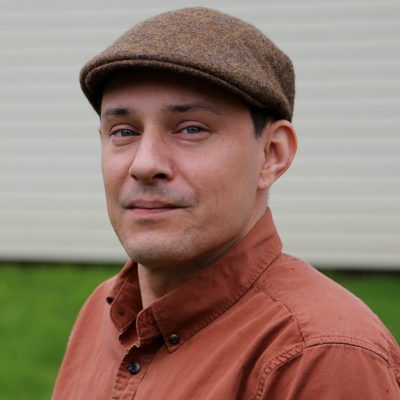Alumnus Spotlight: Jason Corwin, Ph.D. ’15

June 17, 2019
Jason Corwin, Ph.D. ’15, is an alumnus of the natural resources and American Indian and Indigenous studies programs at Cornell, from which he holds a Ph.D. Before enrolling in a doctoral program, he earned his bachelor’s degree in communication from Cornell as well. Now, he works as executive director at Seneca Media and Communications Center.
What fueled your interest to work in this industry?
When I was three and out walking with my dad, I became entranced by a broken camera being thrown out. He looked it over, took it home, fixed it, and taught me how to develop film in a closet. That sparked a lifelong passion for imagery and optics.
What is the most rewarding part of your work in this position?
Leading a team of highly creative and talented indigenous media makers and commercial radio personnel to serve an important purpose – to tell our own stories, our way, for the benefit of our communities and the education of the rest of the world. I am also fortunate to be able to utilize my natural resources background and work with some outstanding environmental and conservation professionals in the Seneca Nation as a member of our Watershed Resources Working Group.
How did you get into filmmaking and documentaries in particular?
About six years before I came to Cornell, I began helping a friend who was working on a documentary and needed a camera operator. With my photography background and some experience in high school with Super 8 filmmaking, I knew I could figure out a video camera. I fell in love with doing moving picture storytelling. As someone working actively on a number of indigenous rights and environmental issues, I saw the importance of media making in bringing voice to stories too often unheard. I actually deferred admission to undergrad for a year or two so I could finish my first feature length documentary, The Flickering Flame – Life and Legacy of Chief Turkey Tayac.
What do you aim to achieve with the documentaries you make?
To truthfully tell stories that I am passionate about, while conveying the emotions, meanings, and significance of the people, places, and events being documented.
What book is currently on your bedside table?
Several books on both mycology and the I Ching actually.
How did your Cornell graduate education prepare you to succeed professionally?
Learning to communicate concisely, clearly, and coherently to reach a wide variety of audiences is something I certainly learned from my graduate education, as well as the significant influence of the late great John Trudell – a poet, orator, and philosopher of the highest caliber. There’s an excellent PBS documentary about him.
What skills did you take away from your degree program that help you in your career?
It really took my writing skills to another level, both through the process of doing my own work and grading students’ work as a teaching assistant. This has been quite helpful as I often need to do copy editing for my team very quickly. Being able to critically assess literature and reports on environmental issues that affect the Seneca Nation and contribute to our working group is definitely a continuation of what I learned to do in my graduate studies.
If you could go back in time to the beginning of your graduate career, what advice would you give yourself?
Don’t ever doubt that your work is academically significant and that it only has to be put in terms that are acceptable to the conventions and trends of your field.
